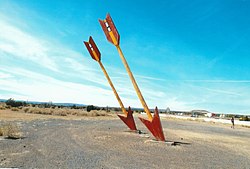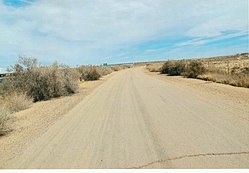Twin Arrows, Arizona: Difference between revisions
m (Task6) HTML cleanup of Category:Pages using invalid self-closed HTML tags |
Marine 69-71 (talk | contribs) →Brief history: link |
||
| Line 18: | Line 18: | ||
Wagon roads routes between Flagstaff and Winslow were surveyed in the 1880s. The [[Atlantic and Pacific Railroad]] choose to build the railroad along it. The railway passed to the north of the modern alignment of the National Old Trails which would eventually become [[US Route 66]]. The [[U.S. Highway System]] established US 66 in 1926. US route 66 served as a major path for those who migrated west during the [[Dust Bowl]] of the 1930s. The road supported the economies of the communities through which it passed.<ref name="USH"> "Bureau of Public Roads"; "American Association of State Highway Officials"</ref> |
Wagon roads routes between Flagstaff and Winslow were surveyed in the 1880s. The [[Atlantic and Pacific Railroad]] choose to build the railroad along it. The railway passed to the north of the modern alignment of the National Old Trails which would eventually become [[US Route 66]]. The [[U.S. Highway System]] established US 66 in 1926. US route 66 served as a major path for those who migrated west during the [[Dust Bowl]] of the 1930s. The road supported the economies of the communities through which it passed.<ref name="USH"> "Bureau of Public Roads"; "American Association of State Highway Officials"</ref> |
||
Traffic began to flow through the Twin Arrows area because Route 66 was aligned along the National Old Trails. A business named the Canyon Padre Trading Post, named for the gorge that cuts nearby, was established in the late 1940s in Twin Arrows. Business was slow for the store and diner until the owners changed its name to "Twin Arrows Trading Post", inspired by nearby town of [[Two Guns, Arizona|Two Guns]] and added a service station. Two 25 foot giant arrows which were placed on the property were easily recognized by traveling motorist and the business began to fourish.<ref name="WA">[http://www.weirdus.com/states/arizona/abandoned/twin_arrows_trading_post/index.php Weird Arizona]</ref><ref name="TATP">[https://www.atlasobscura.com/places/twin-arrows-trading-post Twin Arrows Tarding Post]</ref><ref name="R66">[https://www.theroute-66.com/twin-arrows.html Route 66]</ref> |
Traffic began to flow through the Twin Arrows area because Route 66 was aligned along the [[National Old Trails Road]]. A business named the Canyon Padre Trading Post, named for the gorge that cuts nearby, was established in the late 1940s in Twin Arrows. Business was slow for the store and diner until the owners changed its name to "Twin Arrows Trading Post", inspired by nearby town of [[Two Guns, Arizona|Two Guns]] and added a service station. Two 25 foot giant arrows which were placed on the property were easily recognized by traveling motorist and the business began to fourish.<ref name="WA">[http://www.weirdus.com/states/arizona/abandoned/twin_arrows_trading_post/index.php Weird Arizona]</ref><ref name="TATP">[https://www.atlasobscura.com/places/twin-arrows-trading-post Twin Arrows Tarding Post]</ref><ref name="R66">[https://www.theroute-66.com/twin-arrows.html Route 66]</ref> |
||
==Decline== |
==Decline== |
||
Revision as of 05:17, 4 April 2018
Twin Arrows | |
|---|---|
 Twin Arrows | |
 |
| Part of a series of the |
| Cities, towns and CDPs in Arizona with lists and images of historic properties, forts, cemeteries or historic districts |
|---|
Twin Arrows is a "ghost town" located in the central part of Arizona on US Route 66 in Coconino County between the City of Flagstaff and the town of Winslow.
Brief history
The area in which Twin Arrows is located was inhabited by the Hopi and Navajo tribes. The Navajo's fought against the Apaches in the area. The first setters to arrive in the area of European descent were the Spanish Conquistadores. The area became part of Mexico when Mexico gained it's independence from Spain.
The United States fought against Mexico in what is known as the Mexican-American War. The war ended officially when the 1848 Treaty of Guadalupe Hidalgo was signed and forced onto the remnant Mexican government. It specified its major consequence, the Mexican Cession of the northern territories of Alta California and Santa Fe de Nuevo México to the United States.[1]
Wagon roads routes between Flagstaff and Winslow were surveyed in the 1880s. The Atlantic and Pacific Railroad choose to build the railroad along it. The railway passed to the north of the modern alignment of the National Old Trails which would eventually become US Route 66. The U.S. Highway System established US 66 in 1926. US route 66 served as a major path for those who migrated west during the Dust Bowl of the 1930s. The road supported the economies of the communities through which it passed.[2]
Traffic began to flow through the Twin Arrows area because Route 66 was aligned along the National Old Trails Road. A business named the Canyon Padre Trading Post, named for the gorge that cuts nearby, was established in the late 1940s in Twin Arrows. Business was slow for the store and diner until the owners changed its name to "Twin Arrows Trading Post", inspired by nearby town of Two Guns and added a service station. Two 25 foot giant arrows which were placed on the property were easily recognized by traveling motorist and the business began to fourish.[3][4][5]
Decline
The "Twin Arrows Trading Post" began to fail with the construction of the Interstate Highway 40, since motorists no longer had to take US Route 66. Business for the "Twin Arrows Trading Post" began to decline and it wasn't long before the store/diner/service station/gift shop passed through the hands of various owners. This continued until 1995, when it was finally closed and abandoned. The land where Twin Arrows is located is in the Navajo and Hopi reservations and owned by the Twin Arrows Navajo Casino.[3][4][5]
Images of Twin Arrows
Further reading
- "Ghost Towns and Historical Haunts in Arizona"; Publisher: Golden West Publishers; ASIN: B003HF06YA.






